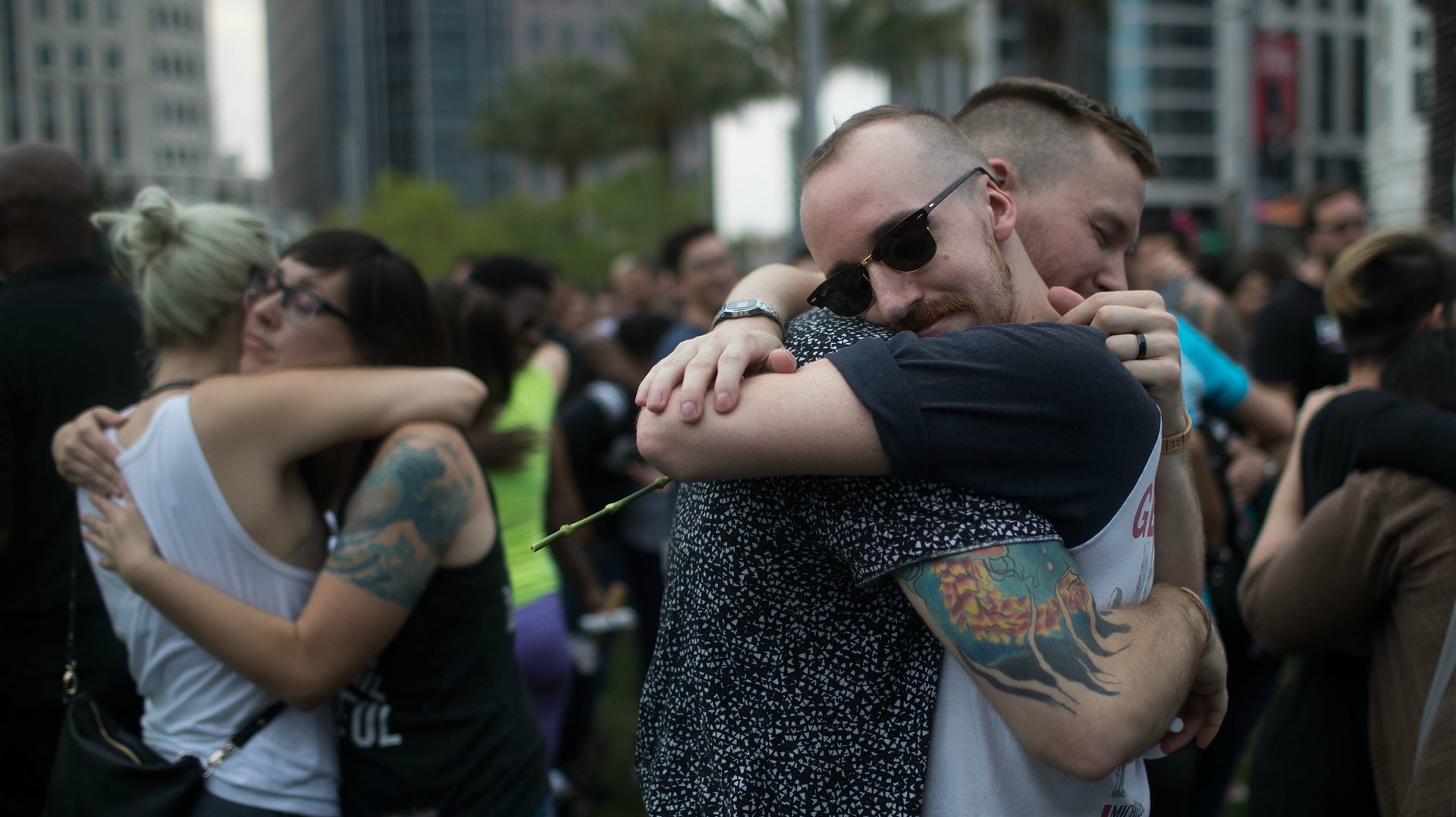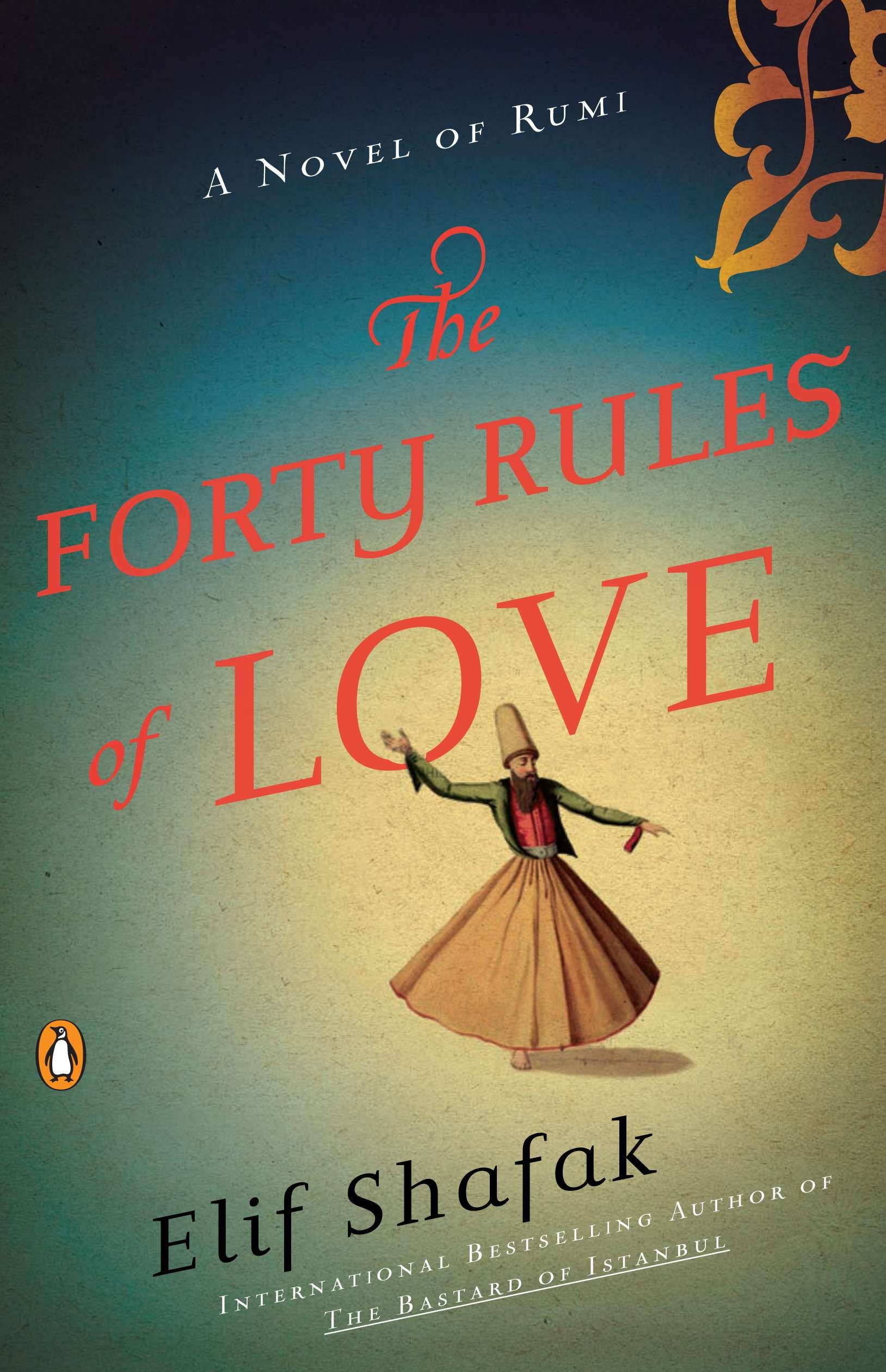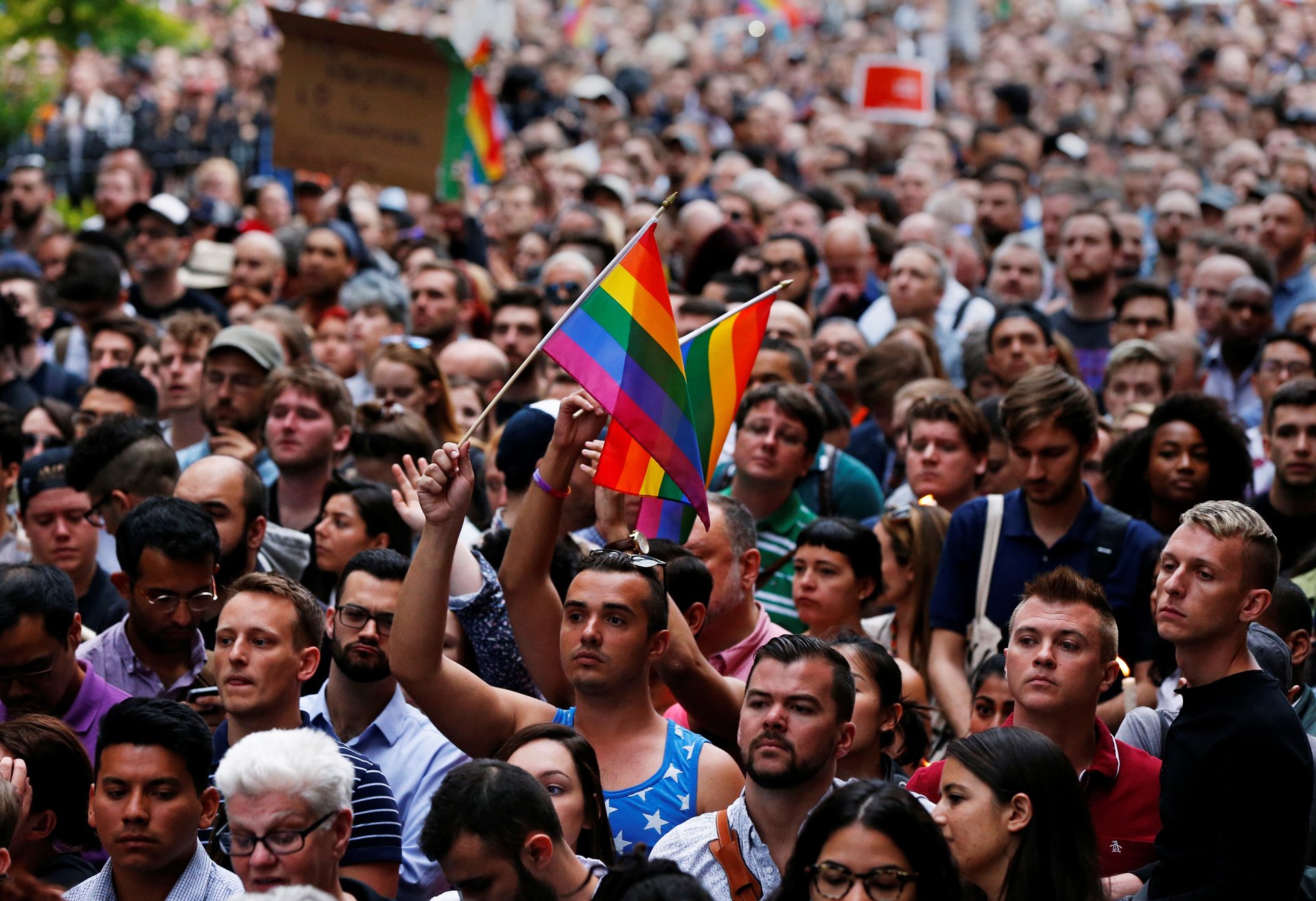Simple, powerful ways any heartbroken American can make a difference after Orlando
What do we know in the wake of the shooting at Pulse nightclub in Orlando last weekend?


What do we know in the wake of the shooting at Pulse nightclub in Orlando last weekend?
A man the FBI previously investigated for ties to terrorist organizations, who was known to be racist, homophobic, and abusive entered the club—the sort of safe, joyous place where people of all colors and sexual preferences danced for hours before wrapping up the night with Donna Summer and defecting to IHOP—with a semi-automatic rifle and a pistol. He killed 50 people, including himself, injured 53, and traumatized countless others.
Reading the victims’ obituaries and survivors’ accounts, it’s easy to feel helpless, to feel jaded, to feel like one’s country is going down the toilet. The massacre in Orlando is brutal evidence of twin plagues that will destroy the US if we let them: gun violence and hatred—in this case, homophobia. To many of us, it’s obvious that more firearms, and more fear, are not the way out of this mess. So what can we do?
The LGBT community, the Latino community, and the Muslim community are suffering right now. But even if you’re not a member of those communities, there are simple things you can do to be an active citizen, rather than a passive observer of what’s happening in this country. You can fight for better gun control, and openly advocate for an inclusive society. You can educate yourself about America’s incredibly diverse population, because we’re stronger when we stand together.
“Hope and love last longer,” said Lin-Manuel Miranda, accepting his Tony Award for Hamilton on June 12. So how do we fight with hope and love? Here are a few ways to get started.
1. Vote, if you can.
If you’re eligible to vote in the US, make sure you’re registered. Generally speaking, Democrats support stricter gun control laws than Republicans. Last December, Republicans voted against proposed bills to block people on terrorist watch lists from buying guns and to expand background checks on those buying weapons at gun shows and online.
You can also use the Human Rights Campaign website to find out whether your elected officials support legislation that protects LGBT people, immigrants, and people of color from discrimination.
You probably already know that voting for Trump in November would be catastrophic. He is a bigot who is attempting to bully his way into the White House by capitalizing on fear, all the while telling lies that promote Islamophobia and lax gun control laws.
2. Tell your elected officials how you feel. They have the power to affect change, but voters must force them to do it.
Earlier this month, Obama warned us that an ISIL sympathizer in the US could legally buy a gun.
If you’d like to live in a country where that’s not the case, you should tell your elected representatives. Here is a very handy guide to doing that in under ten minutes. Use it to find out who your representatives are (and how they’ve voted on gun control), copy and paste a letter into an email, and even tweet at your representatives.
Remember, even Obama wasn’t always “a thunderbolt” for gay rights. His public support—most notably with his stirring speech recognizing the Supreme Court’s position that “love is love,” and more recently with a presidential declaration that June is LGBT Pride Month—reflected a similar shift in public opinion. Similarly, US attorney general Loretta Lynch’s passionate defense of transgender rights in May—something that would have been unthinkable even four years ago—reminds us public awareness and advocacy can make a difference.
It’s up to us to make our opinions known.
3. Educate yourself.
You don’t need to be a member of the LGBT community or a Muslim to see that homophobia and Islamophobia are infecting the US. It might feel hard to be an effective advocate for communities one doesn’t completely understand. But you can read books and watch movies from anywhere, and there are some really wonderful, seminal stories that can help draw the reader into a world they might not actively engage with on a daily basis.

As a starting point, Quartz recently compiled this short list of LGBT novels that illustrate how “weird, soul-filling, heart-crushing, irrational, love isn’t something that belongs only between certain genders.” Some of them have also been made into movies, including the exquisite A Single Man. I would add the recent and wonderful novel How to Be Both, by Ali Smith—a Man Booker prize finalist that The New York Times called “sly and shimmering” to this list, as well Man Alive, a true account by Quartz’s Thomas Page McBee that reads as smoothly as fiction.

As for beginning to explore the Muslim world, Quartz’s Nushmia Khan recommends The Forty Rules of Love, by the Turkish writer Elif Shafak, which intertwines two stories—one ancient, one contemporary—about the 13th century poet Rumi, who was one of Islam’s great spiritual leaders (as well as a best-selling poet in the US). Also check out A Separation, an Iranian film which won the Oscar for best foreign language film in 2012. The film, which takes place in modern-day Tehran, portrays the intricacies of Iranian jurisprudence under Islamic law. But it also tells an intimate, intricate story about a human relationship. The themes of our humanity our universal, we just have to be open to finding them.
4. Show public solidarity—say you care, “even if you’re afraid of looking dumb.”
In the days since the attack, people have gathered for vigils and rallies in honor of the victims of the Orlando attack from Sydney to Stonewall. Join these rallies. Stand with your fellow citizens who are hurting and show the terrorists and bigots that their actions will not divide us.

You can also just say something personally.
Especially in times of tragedy, when people feel afraid, angry, numb, or alone, a small expression of support can make a big difference.
“Tell a queer person you care,” one of my friends advised on Facebook. “Even if you’re afraid of looking dumb.”
Another followed up with a story about a midwestern tourist chatting with her on the subway platform in New York City:
Last night on the train platform I met a middle aged tourist from rural Wisconsin who needed directions. Her name was Kim and she was a straight married lady with kids, and she was not afraid to talk about the attack in Orlando. She asked, “Are you coming from the vigil in the west village?” I said yes, and she started expressing how upset she was by this killing of innocent people and how she thinks we should all be good to each other. She introduced herself to the cute gay boys I was with and we had a nice chat. She sat with us for more than 10 minutes waiting for the L and just being a nice person. She was not afraid to engage, or to say the wrong thing. Letting us, a group of gay strangers, know she was with us was more important to her.I wanted to hug her so bad, actually. The straight silence around this has been deafening, to be honest. And having this lady who looked like my aunts just try to connect and show a little love made me feel somewhat comforted that we are not totally on our own as gay people ALL the time, just most of the time.
Lots of cities will also celebrate Gay Pride with parades in June—another great time to show your support, and share the love.
5. Recognize your power to create positive change.
You might feel like your voice doesn’t matter—maybe because you’re not part of the LGBT, Muslim community, or Latino community, or because you’ve clearly stated your support in the past. But it does.
Wherever you connect with people—whether it’s with your family in the kitchen, your neighbors in the check-out line, or your co-workers at the coffeemaker—talk openly with them, and really listen. These personal spheres of influence are easy places to make a big difference. ISIL’s greatest recruitment tool is disaffection and isolation, which is why it’s so important to fight against the kinds of stigmas and stereotypes that reinforce these feelings. Recognize that if you’re part of the majority—whether that refers to your race, sexuality, or immigration status—that’s a privileged position, and one you can use for positive change. When someone says something prejudiced, even inadvertently, don’t let it stand. Engage. Be a force for understanding. Use the tools you have, so if you’re an educator, talk to your students; if you’re a manager, check in with employees who may be hurting, and make it clear that your workplace does not make excuses for bigotry. Some of the victims of the Orlando shooting never felt comfortable enough to come out as queer to their family and friends—we can all work towards an America where this reality is a relic of the past.
An attack like the one in Orlando is a tragedy for any of us who want a safe, inclusive, and loving country. We can learn from one another, support one another, advocate for each other—and just maybe, start to heal and move forward together.